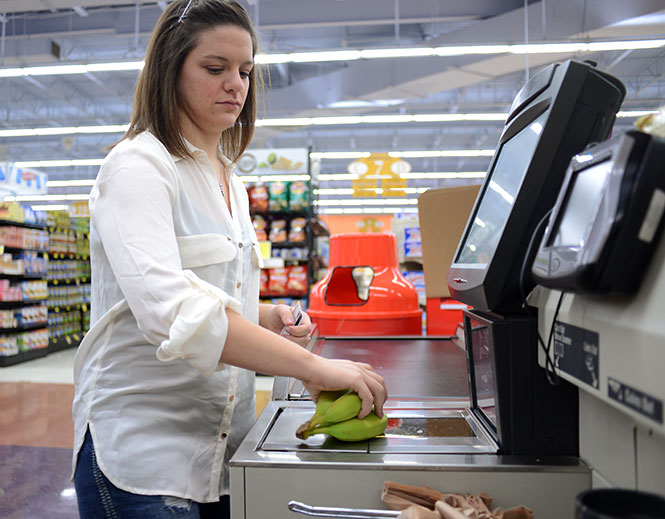From the ground up
Jennifer Jones purchases bananas at Acme in Kent Tuesday Jan. 14, 2014. Jones kept a resolution from December 2012 to become and stay vegan
January 15, 2014
Jennifer Jones said she makes a New Year’s resolution most years. In the past she made resolutions to “pay more attention in school” and to “go to the gym every day.”
But the senior psychology major’s resolution for 2013 proved to be one of the most difficult tasks of her life.
Jones went vegan — deciding not to eat any animals or food produced by animals, except honey — in June 2012. Six months in after having mixed success, she became frustrated, so she made it her resolution for the next year to stay vegan, and she still is to this day.
Jones changed her lifestyle to avoid health issues that run in her family, including heart attacks, high blood pressure and high cholesterol.
The most difficult part about Jones’ life change, she said, is receiving pressure from friends and family members to change her habits back to the way they were. As the only vegan in her family, she finds it difficult to have dinner with her family over the holidays.
“It sucks to be there with your vegetables and potato chips and a bottle of wine,” she said.
Jones’ diet partially consists of pasta, beans, bagels, peanut butter, vegetables, grains, whole wheats and almond milk.
“The world doesn’t really have an understanding of where we can get all of our nutrients from,” she said.
Successful Resolutions
Resolutions don’t have to be centered on working out or eating healthier. These students all successfully kept their New Year’s goals last year as well, and their quality of life improved because of it.

“I learned Spanish.” – Daniel Pieretti, senior speech pathology and audiology major

“To be a better person.” – Karen Angiulo, junior applied communications major


Jones said she has always been healthy. In high school she was a swimmer and diver. Before going vegan, she ate meat and dairy but not a lot of red meat.
Tanya Falcone, a nutrition instructor and coordinator for the Center of Nutrition Outreach, said red meat causes unhealthy inflammation and increases the risk of heart disease.
“Even if you do eat beef that is the leanest cut out there you still end up getting like 10 grams of saturated or unhealthy fats,” she said.
Jones said she recognizes the adverse effects of packaged and microwavable foods, but as a college student, staying away from them isn’t completely realistic.
Some things are unavoidable, like butter. Servers at restaurants will put butter on Jones’ food and it will make her feel sick.
“Every time you’re at a restaurant [vegans are] super careful about everything,” she said.
Jones said studies have been conducted suggesting dairy has harmful effects. A 2001 Harvard’s Physicians Health Study drew links between dairy consumption and prostate cancer.
Falcone said there is conflicting research on whether or not dairy is actually harmful, but almond milk and soy milk are better sources of calcium and vitamin D than regular dairy.
Jones said she was excited when she got her dad to start drinking almond milk. She also tries to help out her friends and sorority sisters with their food choices.
“Vegans believe in their diets,” Falcone said. “It’s a culture.”
Many vegans are concerned about the well-being of animals, and many oppose not only eating, but using or wearing animal products such as leather, Jones said.
“I learned a little about animal cruelty and animal rights,” Jones said. “It’s definitely something I care about. It’s just not the reason I did it in the first place.”
Jones goes to the gym four or five days a week, and she runs. Many people believe vegans don’t get enough essential proteins and nutrients from their diet to sustain running, but it’s a common misconception.
“Running is going to elicit a lot of increases in heart rate,” said Keith Burns, an exercise physiology graduate student and assistant. “It’s going to stress the cardiovascular system to see improvements in cholesterol and blood pressure.”
Jones ran her first marathon in September 2013. Afterward, her dad wanted her to eat fish for protein, and she did. It made her feel sick, but she kept confidence in her vegan diet.
Falcone said vegans can run marathons. They have many protein options, including fruits, vegetables, soy, beans, lentils, nut spreads and quinoa.
“Things that grow out of the ground tend to be pretty good for you,” Jones said.
Jones plans to stay vegan for the foreseeable future. She feels healthy, and her cholesterol is nearly perfect.
Contact Patrick Williams at [email protected]












